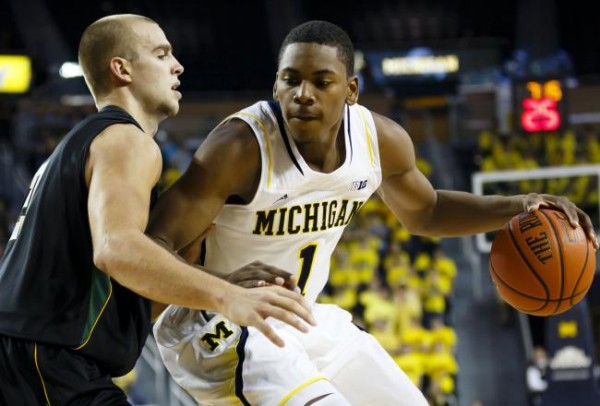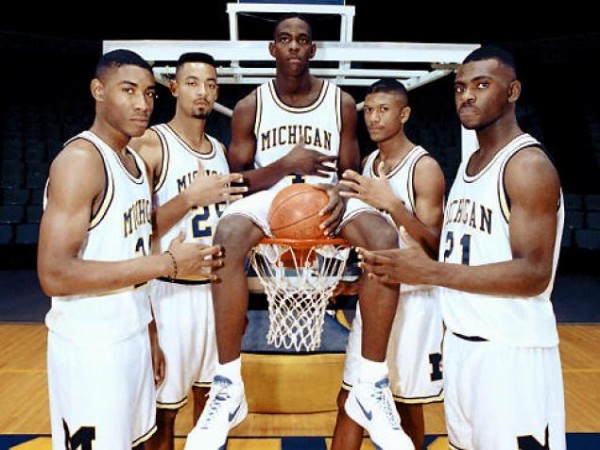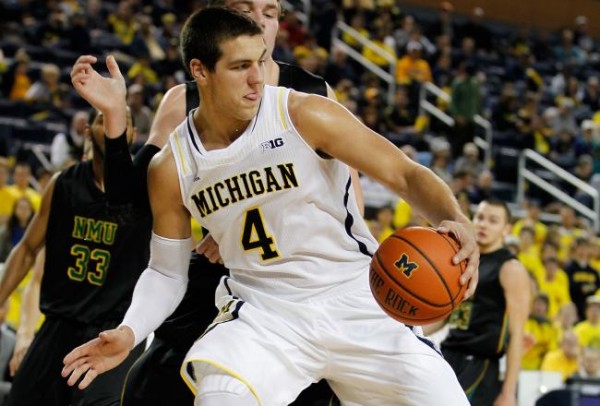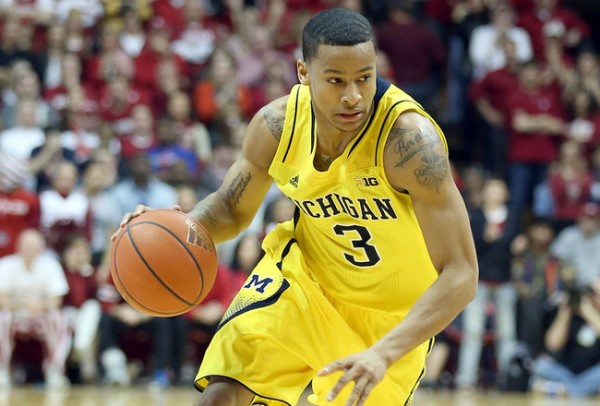Final Four Profiles In-Depth: Michigan Wolverines
Posted by Chris Johnson on April 3rd, 2013Chris Johnson is an RTC Columnist. He can be reached @ChrisDJohnsonn.
The last team remaining from the best conference in the country quietly enters the Final Four with much the same youthful construction of last season’s Kentucky Wildcats. Don’t believe it? True story: Michigan starts three freshman – forwards Nik Stauskas, Glenn Robinson III and center Mitch McGary – a sophomore (Trey Burke) and a junior (Tim Hardaway Jr). It is the youngest team left in this NCAA Tournament and, like Kentucky, heavily relies on three first-year stars. This weekend, that youth, the legs that power the nation’s No.1 offense, will meet a defense unlike any it has seen all season. The Wolverines have already eliminated #5 seed VCU, #1 seed Kansas and #3 seed Florida, with each game presenting a different challenge from the previous. Syracuse offers something completely unique – a hellacious 2-3 zone defense operating at full force. So let’s peel back the curtains and explore whether Michigan can survive Saturday’s semifinal and, if so, whether a follow-up win in the national championship is in the offing.
(Also feel free to revisit Tuesday’s Final Four team du jour: Wichita State)
Pre-Tournament Capsule. From November to January, everything about Michigan suggested the bullish preseason predictions – that Michigan was a top-five team, that Trey Burke was an All-American, that John Beilein’s perimeter-oriented system would flourish with so much talent at his disposal – were rooted more in reality than typical overzealous summer conjecture. The Wolverines got out to a 16-0 start, claiming non-conference wins over Kansas State, Pittsburgh and Arkansas, and entered a January 13 game at Ohio State with the No. 2 ranking and all the signs of a true Big Ten title contender. The Wolverines fell behind early and never made it back, and after following up the OSU loss with four straight wins, lost three of their next four during a brutal four-game stretch that included games at Indiana, home against Ohio State, at Wisconsin and at Michigan State.

But for a rocky scheduling patch in early February, Michigan ran into few problems it couldn’t handle in the regular season (Getty Images).
The constant grind of Big Ten competition – from the raucous arenas to the physicality of the play to the demanding mental and physical toll of a 40-minute contest against a multitude of top-10 teams – left Michigan tied for fourth at the end of regular season play. The early sizzle of the Wolverines’ high-powered offense and freshman star power was fading fast, and a convincing nine-point loss to Wisconsin in the Big Ten Tournament only hammered home the idea that Michigan was probably still too young and inexperienced to cause any serious damage in an NCAA Tournament setting.
How they got here. An interesting first-round draw with South Dakota State, where the point guard battle between Burke and Nate Wolters was seen as one of the more interesting one-on-one match-ups of the opening round, didn’t meet the price of admission. Burke finished with just six points, and Wolters had 10, but the Wolverines rode the efficient offense of Robinson III and Hardaway Jr., 21 points on 8-of-9 and 8-of-13 shooting, respectively, to a comfortable victory. VCU’s suffocating HAVOC pressure was the next bump in the road, and Michigan handled it with more composure and poise than any of VCU’s other opponents had all season. McGary pummeled the Rams’ minuscule front line with 21 points and 14 rebounds and Michigan calmly turned in a 25-point victory.
Six days later, Michigan found itself trailing Kansas by five with 30 seconds remaining in a hard-fought Sweet Sixteen battle. There’s nothing wrong with losing to the Big 12 champs, a #1 seed with experienced role players, a lottery-bound freshman and the best shot-blocker in the country – but Michigan had other ideas. The Wolverines stormed back to pull within three on their final trip down the court, the perfect prelude to Burke’s ridiculous 30-foot rainbow that sent the game into overtime, where UM scraped out a two-point win. It was the game of the tournament, maybe the game of the year, but it meant so much more. It was more than just another instance of Burke’s insane range or the powerful snowballing of late-game shot-making. After months of frustrating conference losses and lineup mismanagement (see: McGary, bench), the Wolverines had found the balance and emotional fortitude and inner calm to eke out a massive win. Michigan came together with its NCAA Tournament life on the line, and its next game – an outright obliteration of #3 seed Florida, the top team in Ken Pomeroy’s efficiency rankings, in the Elite Eight – embossed the Wolverines’ newfound confidence and inspired play. UM’s impressive four-game run has turned a dangerous but young team into a credible championship threat as it enters the final weekend of the college basketball season ignited with a euphoric surge of confidence and good vibes.
Final Four History.

Two of Michigan’s Final Fours were vacated thanks to the Fab Five’s amateurism-related noncompliance (AP Photo).
A simple historical accounting of Michigan’s Final Four appearances will leave you unsatisfied. National semifinal appearances should be fairly straightforward, but in Michigan’s case, the NCAA has some say in the matter. The Wolverines’ 1992 and 1993 Final Four trips were expunged from the official record as part of the NCAA’s punishment for the Fab Five-connected Ed Martin improper benefits scandal. So if we’re talking Final Fours and Michigan, officially the Wolverines have only been four times, the last coming in 1989. In the real world, where transcendent freshmen and baggy shorts and black socks captured the college basketball world and made Michigan hoops an enduring national phenomenon, six would be the more appropriate quantification of Michigan’s national semifinal participation. But that’s just me.
Season High Point. No single game marked the defining high point of Michigan’s season. The Wolverines’ crowning moment was more symbolic, borne of more than a decade’s worth of mediocrity following the Fab Five Era. On January 28, after a convincing 14-point win at Illinois, Michigan was voted No. 1 in the AP Poll for the first time since the 1992-93 season. The Wolverines’ long climb out of the Big Ten cellar reached something like a high point last season, when the Wolverines claimed a share of the Big Ten title, but to don college basketball’s unifying symbol of unparalleled greatness, even if only for a week, crystallized the high-profile return of a long-struggling program. I’m not too big on polls as a veritable indicator of team performance or a predictive measure of future success (the way the No. 1 spot made the rounds this season made it seem as if teams were more content shunning that shining individual spotlight, and less honored by the weekly distinction) but the polls are good for intangible things – things like widespread plaudits for a program’s official return to power. For Michigan, grabbing the top ranking was a big deal.
Season Low Point. Schedule losses were a common theme in the 2013 Big Ten. There were so many dangerous teams, and only so much flexibility on each team’s schedule, that four-game stretches like this – at Indiana, Ohio State, at Wisconsin and at Michigan State – were practically unavoidable. Michigan approached that grueling gauntlet having won four straight, and by the time it was over, after leaving the Breslin Center smarting from a 23-point smackdown, the Wolverines had lost three of four, dropped to 8-4 in Big Ten play and were beginning to feel like a promising but withering group that fell just a cut below the elite. Michigan had hit a scheduling patch it couldn’t handle, but the optics – losing three of four – oversold the severity of the situation. Michigan turned out just fine, if I may so myself. (A note: the road loss at Penn State typifies the deepest realities of the term “low point.” That was a horrific loss, don’t get me wrong. It was also extremely out of character for an overall consistent and otherwise bad loss-free squad. You can’t extrapolate any further analysis from a wayward data point like that, so I let it stand as a rogue result, blanketed by abundant success and high-win total. But yeah, losing to Penn State was not Michigan’s brightest moment.)
What’s Working. There is an easy answer to this question, and that answer starts and ends with Trey Burke. Allow me put my coaching hat on and offer John Beilein this bit of ingenious advice: your team is better when Burke touches the ball. A lot better. Michigan’s Final Four run isn’t so easily defined, obviously, so I’ll highlight another player of note: McGary. Before McGary’s sudden NCAA Tournament star-turn – in which he dropped 24 points and 21 rebounds on an unsuspecting VCU, beasted the best interior defender in the country (Withey) for 25/9, and only slightly took his foot off the gas in the midst of a roaring demolition of Florida – there was a lot to like about Michigan. But something felt incomplete.

A huge uptick in performance from McGary has helped power Michigan through four Tournament opponents (Getty Images).
It wasn’t guard play; Burke and Nik Stauskas and Hardaway Jr. are doing just fine, thank you very much. It wasn’t coaching; Beilein has unleashed his usual guard-focused system, only with more effective and talented interacting parts. It was interior offense, and McGary was the answer. His emergence did more than fill whatever low-block void Michigan may have had. Now Michigan’s interior offense, once a position of weakness, has been turned into one of the Wolverines’ most important assets in a Final Four stocked with bruising front lines and relentless rim-protectors.
What’s Not Working. When a team is peaking in such demonstrative fashion, when everything is clicking, when both ends of the court are home to some of the best and most complete basketball we’ve seen all season from any team, pointing out any real defining weaknesses is like trying to write a scathing dissertation on the egregious stylistic conflicts of the Mona Lisa. Say what you want about Da Vinci’s choice of contrasting hues or the outwardly arrogant countenance worn by the work’s central character, that painting is universally respected and historically revered for a reason (the likes of which I’m not prepared to describe in detail for the purposes of this piece). Michigan is playing at such a high level that Rennaissance painting analogies and frantic team-wide investigation left me at the following disappointing and brief conclusion: The Wolverines could probably use a little more scoring from Hardaway Jr. Boring, right? I thought so too, which is why Hardaway Jr.’s point production – 19 points combined off 7-of-24 shooting in two previous games – is something Michigan fans should worry about if and only if Burke goes completely cold, McGary reverts back to his merely serviceable mid-season self and Stauskas suddenly loses the kinetic function in his arms allowing him to shoot and make three-pointers. In other words, Michigan’s offense is humming whether or not Hardaway Jr. scores. Better to table the issue, hope for the best and worry about it later.
Why Michigan Will Win It All.

The national player of the year frontrunner, Burke has the means and the will to lead the Wolverines to a national championship (Getty Images).
All of the team-specific and general match-up analysis written this week about this Final Four comes with one underlying recognition: Michigan has the best offense in the country. No, really: The Wolverines average 121.9 points every 100 possessions, eight tenths of a point higher than No. 2 Indiana and a full 4.5 points higher than the next best offense remaining, No. 5 Louisville. The Wolverines probably won’t hit their usual blistering pace against Syracuse’s stingy 2-3, or a prospective match-up with Louisville’s hard-pressing, turnover-creating, No. 1-ranked defense. But here’s the thing – Michigan doesn’t need to. The Wolverines just need to outscore the team positioned opposite them on the court, and if they’re hitting shots and spacing the floor and running their stuff the same way they have all NCAA Tournament long, that offense can go a long way. Even the most disciplined and zip-tight defenses can’t stop the nation’s best offense at its peak.
Why Michigan Won’t Win It All. From the coach to the star point guard to the three freshmen who take the court every time Michigan tips off a basketball game, this is all very new and exciting stuff for the Wolverines. Beilein has never been to a Final Four, nor has Burke, or anyone else donning UM’s highlighter yellow threads. That is why this run is so remarkable – because three freshmen and a great point guard and a coach without Final Four experience don’t typically make it all the way here. Their inexperience causes them to bow out early, reflect on the good times and recharge for next season. Having Final Four experience to draw on – take Louisville, for example – can make the difference between exciting basketball and national champions. Michigan has the former covered, but will excitement alone be enough to get it over the hump? Will freshmen nervousness and coaching stage fright take over when faced with Hall of Fame-worthy legends (Boeheim, Pitino), obscure defensive strategies and experience-laden teams? Even if the answer is yes, we won’t ever really know the full rationale. If Michigan loses, experience won’t be the most easily identifiable reason. But it certainly factors into the equation, and any vehement denial that the Wolverines won’t be at least a tiny bit spooked or awestruck by the big stage is missing the point. This is a big step for Michigan. I’m just not sure if it’s ready to make it.













































